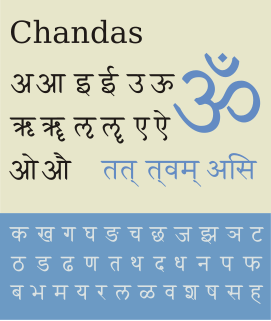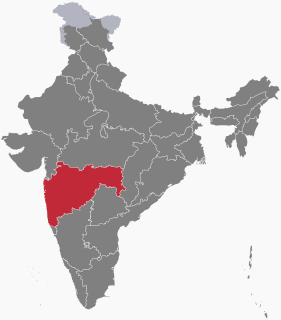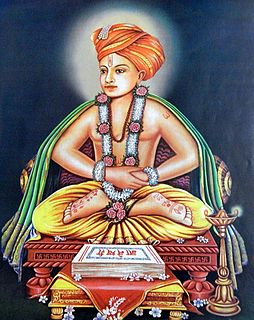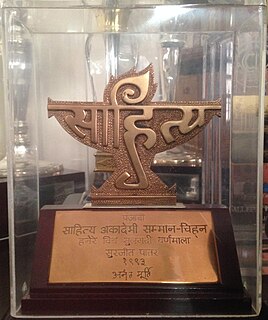Madhukar Vasudev Dhond (M. V. Dhond, In Devanagari: मधुकर वासुदेव धोंड, म. वा. धोंड) (October 3, 1914 – December 5, 2007) was a literary and art critic from Maharashtra, India.

Devanagari, also called Nagari, is a left-to-right abugida (alphasyllabary), based on the ancient Brāhmī script, used in the Indian subcontinent. It was developed in ancient India from the 1st to the 4th century CE, and was in regular use by the 7th century CE. The Devanagari script, composed of 47 primary characters including 14 vowels and 33 consonants, is one of the most adopted writing systems in the world, being used for over 120 languages. The ancient Nagari script for Sanskrit had two additional consonantal characters.

Maharashtra is a state in the western peninsular region of India occupying a substantial portion of the Deccan plateau. It is the second-most populous state and third-largest state by area in India. Spread over 307,713 km2 (118,809 sq mi), it is bordered by the Arabian Sea to the west, the Indian states of Karnataka and Goa to the south, Telangana and Chhattisgarh to the east, Gujarat and Dadra and Nagar Haveli to the north west, and Madhya Pradesh to the north. It is also the world's second-most populous subnational entity. It was formed by merging the western and south-western parts of the Bombay State, Berar and Vidarbha, and the north-western parts of the Hyderabad State and splitting Saurashtra by the States Reorganisation Act. It has over 112 million inhabitants and its capital, Mumbai, has a population around 18 million making it the most populous urban area in India. Nagpur hosts the winter session of the state legislature. Pune is known as 'Oxford of the East' due to the presence of several well-known educational institutions.

India, also known as the Republic of India, is a country in South Asia. It is the seventh largest country by area and with more than 1.3 billion people, it is the second most populous country as well as the most populous democracy in the world. Bounded by the Indian Ocean on the south, the Arabian Sea on the southwest, and the Bay of Bengal on the southeast, it shares land borders with Pakistan to the west; China, Nepal, and Bhutan to the northeast; and Bangladesh and Myanmar to the east. In the Indian Ocean, India is in the vicinity of Sri Lanka and the Maldives, while its Andaman and Nicobar Islands share a maritime border with Thailand and Indonesia.
Contents
He wrote in Marathi on Dnyaneshwar, Namdev, Tukaram, Ramdas, Vitthal, Raghunath Dhondo Karve, Ram Ganesh Gadkari, Bal Sitaram Mardhekar, Dattatraya Ganesh Godse, Anandi Gopal Joshi, Ranjit Desai's novel Swami, Vijay Tendulkar's play Sakharam Binder, and many other topics.

Marathi is an Indo-Aryan language spoken predominantly by around 83 million Marathi people of Maharashtra, India. It is the official language and co-official language in the Maharashtra and Goa states of Western India, respectively, and is one of the 22 scheduled languages of India. At 83 million speakers in 2011, Marathi ranks 19th in the list of most spoken languages in the world. Marathi has the third largest number of native speakers in India, after Hindi & Bengali. The language has some of the oldest literature of all modern Indian languages, dating back to around 900 AD. The major dialects of Marathi are Standard Marathi and the Varhadi dialect. Koli and Malvani Konkani have been heavily influenced by Marathi varieties.

Dnyaneshwar, also referred to as Jnaneshwar, Jnanadeva, Dnyandev or Mauli (1275–1296) was a 13th-century Marathi saint, poet, philosopher and yogi of the Nath tradition. In his short life of 21 years, he authored Dnyaneshwari and Amrutanubhav. These are the oldest surviving literary works in the Marathi language, under the patronage of the Yadava dynasty of Devagiri, and these are considered to be milestones in Marathi literature. Dnyaneshwar's ideas reflect the non-dualistic Advaita Vedanta philosophy and an emphasis on Yoga and oneness of Vishnu and Shiva. His legacy inspired saint-poets such as Eknath and Tukaram, and he has been one of the foundations of the Varkari (Vithoba-Krishna) Bhakti movement tradition of Hinduism in Maharashtra.

Namdev, also transliterated as Nam Dayv, Namdeo, Namadeva, was an Indian poet and saint from Maharashtra, India who is significant to the Varkari sect of Hinduism. Bhagat Namdev's writings were also recognized by the "Gurus" of Sikhism and are included in the holy book of Sikhism, the Sri Guru Granth Sahib. Namdev worship lord Vitthal that is one of the name of lord Vishnu. Also other Hindu warrior-ascetic traditions such as the Dadupanthis and the Niranjani Sampraday that emerged in north India during the Islamic rule.
Dhond received in 1997 a Sahitya Akademi Award for his book Jnaneshwaritil Laukik Srushti. [1]

The Sahitya Academy Award is a literary honor in India, which the Sahitya Akademi, India's National Academy of Letters, annually confers on writers of the most outstanding books of literary merit published in any of the major Indian languages recognised by the Sahitya Akademi, New Delhi.




